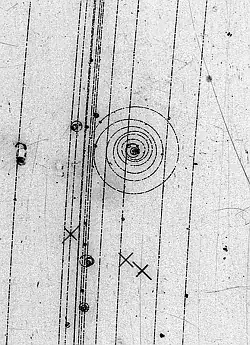It will depend on the experiment and the interaction studied. Usually in particle physics we are not worried about recording position since we are interested in the energy momentum four vector and take Heisenberg's uncertainty as axiomatic. Only if one wants an experiment to test particularly the HUP this would make sense.
Here is a simple interaction in a bubble chamber.

One of the incoming charged $K^-$ beam hits an electron in an atom in the chamber and the electron leaves with high momentum, bending in the magnetic field of the chamber (perpendicular to the picture) and loses energy by ionising (low momentum electrons make the dots) atoms and leaving a measurable track. The momentum is calculated using the spiral, measured with position measuring machines, and the interaction happens at the point, which can also be measured .
If one puts the numbers down the HUP is fulfilled because the measuring errors both in delta(x,y,z) and delta(p) are large and fulfill the HUP inequality.
The same logic holds for complicated interactions and complicated detectors as the ones in the LHC.
Maybe you should give an example of what type of interactions you are thinking about.
